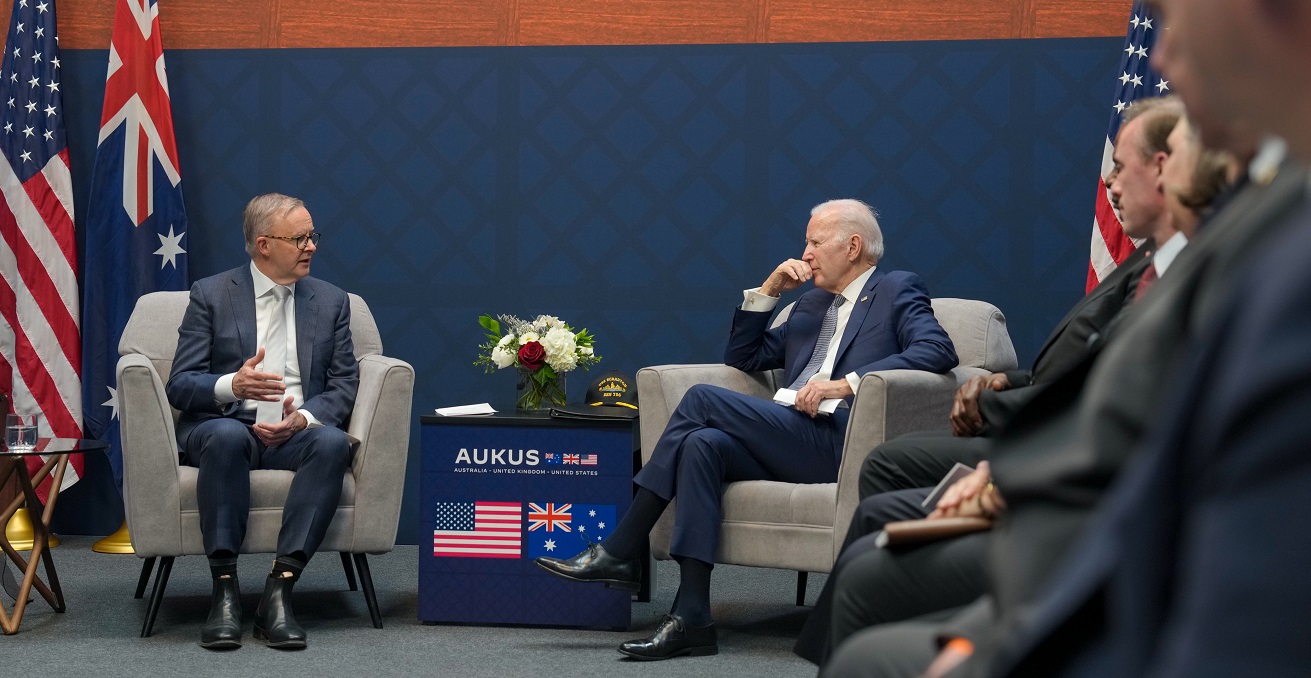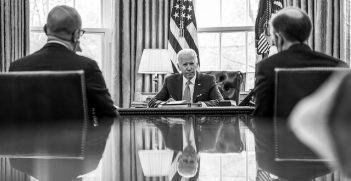Australia and the US Under Albanese: Relations Renewed But Challenges Remain.

The cancellation of the Quad summit due to Biden’s absence demonstrates to Australia the desperate need to diversify its international and security relationships. For now, the grouping is at the mercy of US congressional interests and divisions.
The election of Anthony Albanese has opened up new space in the US-Australia Alliance. After 14 months of awkward relations during Scott Morrison’s leadership, where Biden’s climate-focused foreign policy rubbed decidedly against Morrison’s climate hesitation, the Alliance is strengthened under Albanese-Biden. Increased defence cooperation has seen Australia lean on the US for enhanced security, but as the cancellation of the Quad Summit shows us, we can’t always count on the US.
Over the past year, US-Australian relations have warmed as Biden and Albanese formed a friendship beyond standard bilateral ties. No longer dealing with conservative leader, “that fella down under” Morrison, Albanese and Biden have similar interests in regional security and climate change.
Climate change has become a third pillar in the Alliance, with the recent US-Australia Statement of Intent on climate, critical minerals, and clean energy. The new Climate, Critical Minerals, and Clean Energy Transformation Compact (Compact) establishes a “shared industrial base” that puts climate as a “central pillar.” The Statement underscores the need for a series of working groups to enhance Alliance climate cooperation. As Wesley Morgan argues, Australia and the US have an opportunity to be climate allies through strengthening defence, clean energy supply chains, and regional climate financing, particularly with Pacific Island countries. The Alliance’s climate pillar also paves the way for greater engagement with Indigenous and Pacific communities.
The 2022 AUSMIN Joint Statement represents an expanded Alliance that considers next-generation issues. For the first time in AUSMIN history, the statement included Indigenous peoples, ensuring their “voices are heard at the international level.” Already we have seen more commitment to diversify the Alliance, with US Secretary of the Interior Deb Haaland giving a public address to the Perth USAsia Centre. Haaland is the first Native American to serve as a cabinet secretary. Hopefully the announcement of the inauguration of an Australian ambassador for First Nations People, Justin Mohamed, as well as the First Nations Foreign Policy and the upcoming referendum, will increase commitment to expanding Indigenous inclusion in the Australian side of the Alliance.
Engagement with the Pacific has increased, however not without criticism. The Partners in the Blue Pacific Initiative have been rightly criticised for “co-opting the Blue Pacific narrative” and disregarding Pacific-led regionalism. Further, despite the US designating the Pacific as Australia’s (and New Zealand’s) area of responsibility, it has stepped up its engagement with the region. This is seen in the first US-Pacific Islands Country Summit and increased engagement with the region, providing security and development support. For Australia, this signals that further engagement with the Pacific is needed. Albanese’s strong climate policy and bidding to host COP31 with the Pacific is a welcomed step, but domestic climate policy still needs to be improved if Australia wants to become a partner of choice.
This past year has signalled a new era of US-Australia military cooperation, including the “increased rotational presence of US forces in Australia” and overall more US investment in Australian forward-basing facilities. AUSMIN outlined further cooperation in logistical support and providing humanitarian assistance and disaster relief to the Indo-Pacific. It notes that US-Australian defence relations are in concert with trilateral commitments with Japan and AUKUS. The statement invites Japan to enhance its participation in Australian force posture initiatives. The inclusion of trilateral defence engagement is a positive step towards diversifying Alliance engagement in the Indo-Pacific, strengthening regional security.
For Australia, however, there is a risk of placing too many eggs in one basket. The Defence Strategic Review sees Australia “go all in with the US alliance,” notably for the reason that Australian “security planning is increasingly reliant on stability in Washington.” Australia’s foreign and defence policy depends on continued US engagement in the Indo-Pacific. This is at a time when US economic policy is becoming increasingly protectionist. Meanwhile, the success of AUKUS is contingent upon the US reforming International Trade in Arms Regulations (ITAR) and Congress needing to approve the sale of Virginia-class nuclear submarines. Indicatively, the AUKUS agreement and the Defence Strategic Review leave Australia exposed to the whim of US politics. Even on climate, the Inflation Reduction Act could limit US-Australia climate cooperation.
The cancelled Sydney Summit
The Sydney Quad Leaders’ Summit was penned to be Australia’s biggest international political event since hosting the G20 Brisbane meeting in 2014. While a blow to what would have been an opportunity for the Albanese government to showcase its foreign and defence agenda to an international audience, this does not signal the end of the Quad.
Catastrophising the cancellation of Biden’s trips to Papua New Guinea and Australia only harms relations. The debt ceiling crisis has been an issue for weeks, and policymakers would have taken the possibility of Biden’s cancellation into consideration during planning. While it is a bad look for a government that has said “democracies deliver,” leaders understand that domestic policy will always take priority over international visits. An economically stable US is important for US engagement in the Indo-Pacific.
As an informal dialogue, the Quad has the ability to be flexible amid leader cancellations and crises. The Quad leaders still met on the sidelines of the G7 meeting in Tokyo. This presents an opportunity for it to be a more inclusive dialogue that brings in Indo-Pacific states, instead of an exclusive group of four.
What the cancellation of the Sydney Summit demonstrates is that Australia, the Quad, and the broader Indo-Pacific need to diversify their alliances and cooperation. While it is not surprising that Biden cancelled his trips to Australia and Papua New Guinea, it is surprising that the entire leader’s meeting was cancelled also. As the US approaches a debt ceiling crisis, domestic politics will of course take precedence over international travel. After all, only since Biden’s election has the Quad been reinvigorated. A potential re-election of Trump or a Trump-like leader could put the Quad 2.0 to rest. Australia, along with other Indo-Pacific states, needs to look at regional alliances beyond the US. The other Quad states could also assume a greater leadership role in the Indo-Pacific to fill any gaps left by a change in US foreign policy.
With Albanese’s election strengthening US-Australian relations, we have seen a more mature and more diverse alliance step forward, as like-minded leaders seek to create a more stable region and centre climate change in their diplomacy. However, increased bilateral relations must not be to the detrement of relations with Indo-Pacific friends.
Kate Clayton is a Research Officer at La Trobe Asia. Her research areas include Australia, China, the Pacific Islands and the United States. Her focus is on security, geopolitics, and climate change. She has completed her Master of International Relations (International Security) at the University of Melbourne and a Bachelor of International Relations (Asian Studies) at La Trobe University. Kate is the former Chief Operations Officer at Young Australians in International affairs. Twitter: @kateclaytn.
This article is published under a Creative Commons License and may be republished with attribution.





